On this day, 115 years ago, a tremendous explosion occurred in the sky above the Podkamennaya Tunguska River basin in Russia. It was caused by the entry of a celestial body into the Earth’s atmosphere, most likely a small asteroid or comet fragment.
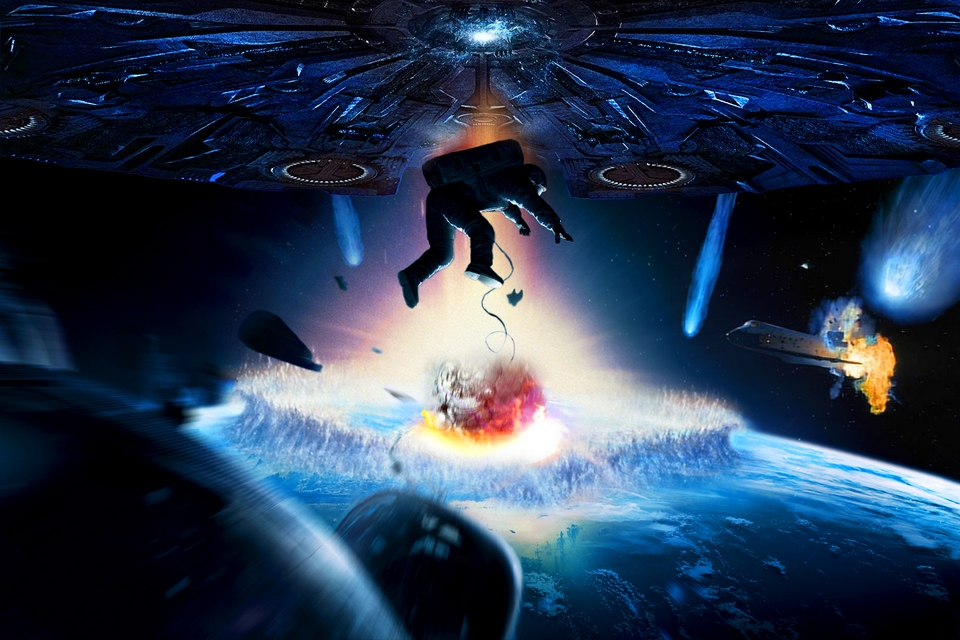
In 1908, humanity barely noticed the event in Siberia. However, today we have much more knowledge about the comet-asteroid threat and understand the consequences that a similar explosion above populated areas would entail. Commemorating the anniversary of the Tunguska meteorite impact, The Universe Space Tech team have compiled a selection of the five most spectacular space disaster films dedicated to cosmic threats.
Independence Day
What is the film about?
An alien fleet arrives on Earth with the intention of capturing it. Humanity must find a way to defend their planet against a technologically superior enemy.
What makes it interesting?
Formally, Independence Day is not a pure disaster film. It is also a science fiction action film (in essence, a modern interpretation of War of the Worlds) with numerous action scenes. However, it were the episodes of destruction that made it so famous.
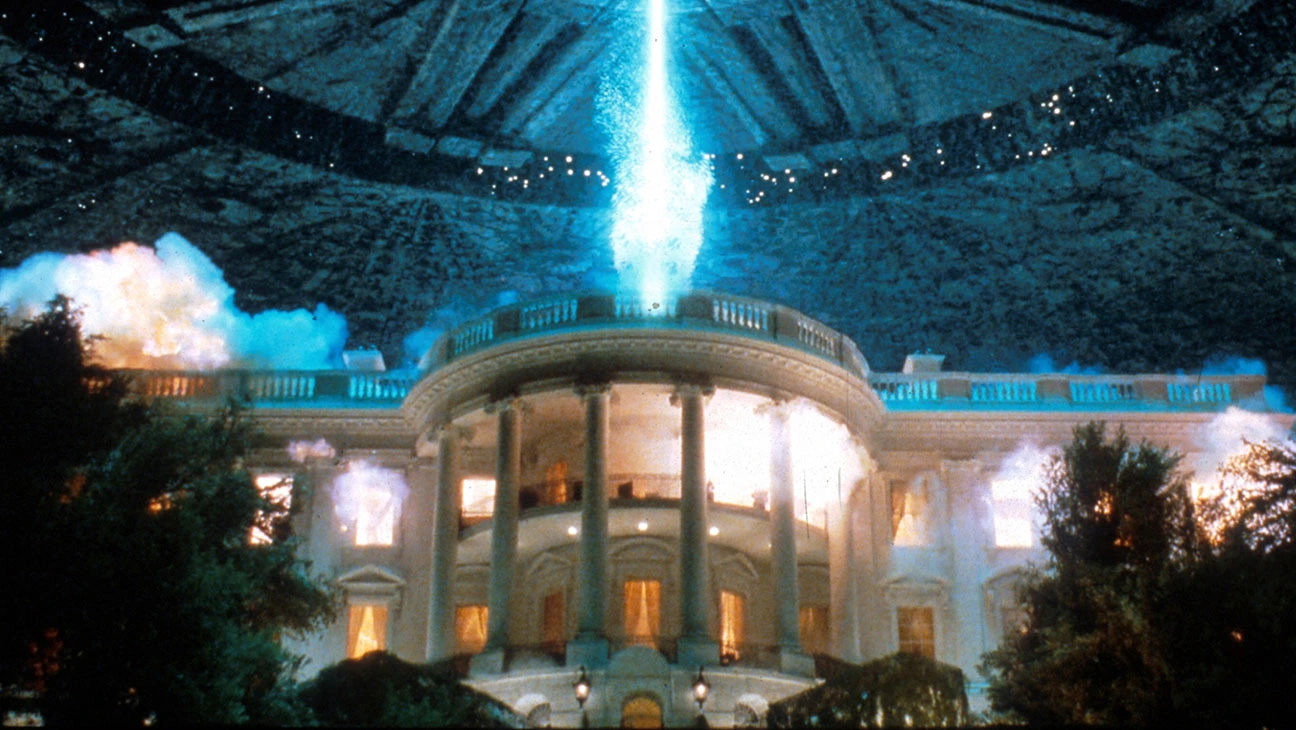
Even after nearly thirty years, Roland Emmerich’s film still retains much of its impact. The scenes of destruction by the invaders of the main symbols of the United States are equally impressive in their scale and relentlessness. Since then, many directors (including Emmerich himself) have attempted to replicate their style. However, Independence Day remains one of the first films that come to mind when thinking about mass destruction of cities on the big screen.
The film also benefits from the presence of the charismatic Will Smith, well-executed aerial battle sequences, and the overall message of the film regarding the survival of humanity through unity. Admittedly, it is accompanied by a significant amount of pathos and patriotism, but that doesn’t make it any less relevant.
Armageddon
What is the film about?
An asteroid the size of Texas is on a collision course with Earth. With less than a month until impact, NASA turns to the world’s best drilling team for help. Their mission is to drill into the asteroid and place a nuclear bomb inside.
What makes it interesting?
The name Armageddon has long become synonymous with a category of Hollywood films: popcorn blockbusters whose creators focused on maximizing explosions and destruction, with the plot serving as a mere backdrop.
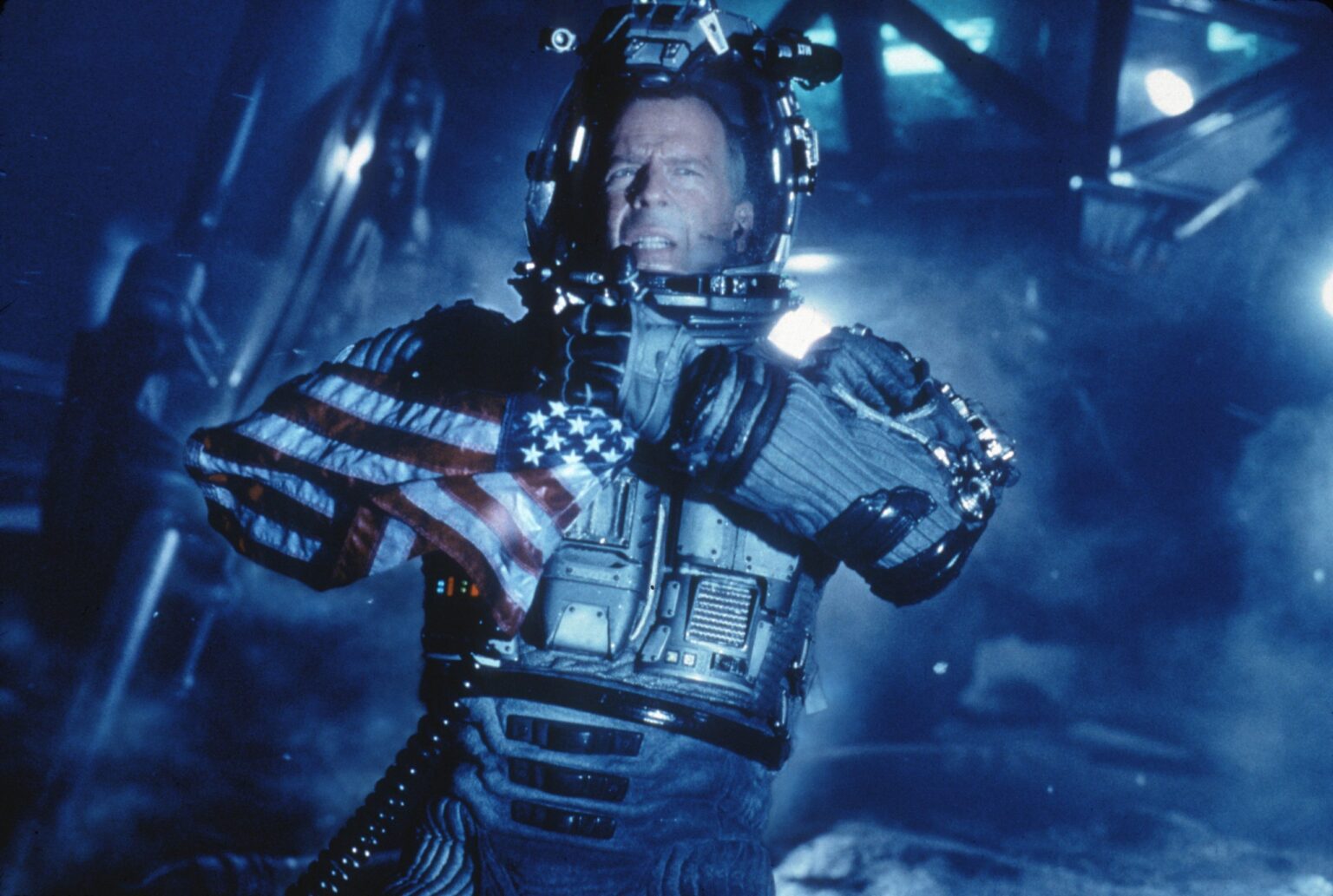
It’s hard to argue with that. Armageddon is a film that doesn’t even attempt to rely on scientific accuracy. It is said that NASA shows it to their newcomers, who then compete to find as many mistakes as possible.
However, despite all its absurdities, clichés, and excessive pathos, or perhaps even because of them, Michael Bay’s film is still popular among audiences. It offers plenty of visually stunning scenes, a memorable soundtrack, and, as the icing on the cake, a clean-shaven Bruce Willis once again saving the world. The film is also interesting because NASA granted the production crew full access to their facilities. So while watching the movie, you can catch a glimpse of the famous Vehicle Assembly Building, the Neutral Buoyancy Laboratory, and an actual space shuttle on the launch pad.
Deep Impact
What is the film about?
Our planet is threatened by an imminent collision with a comet that will lead to the destruction of all life. To save Earth, the spacecraft Messiah is sent to the comet to detonate it. But will the crew succeed in their mission? Or is humanity doomed?
What makes it interesting?
Deep Impact, released in 1998, came out just a few months before Armageddon. These two films are fascinating to watch together and then compare because they present two completely different perspectives on how to depict the end of the world.
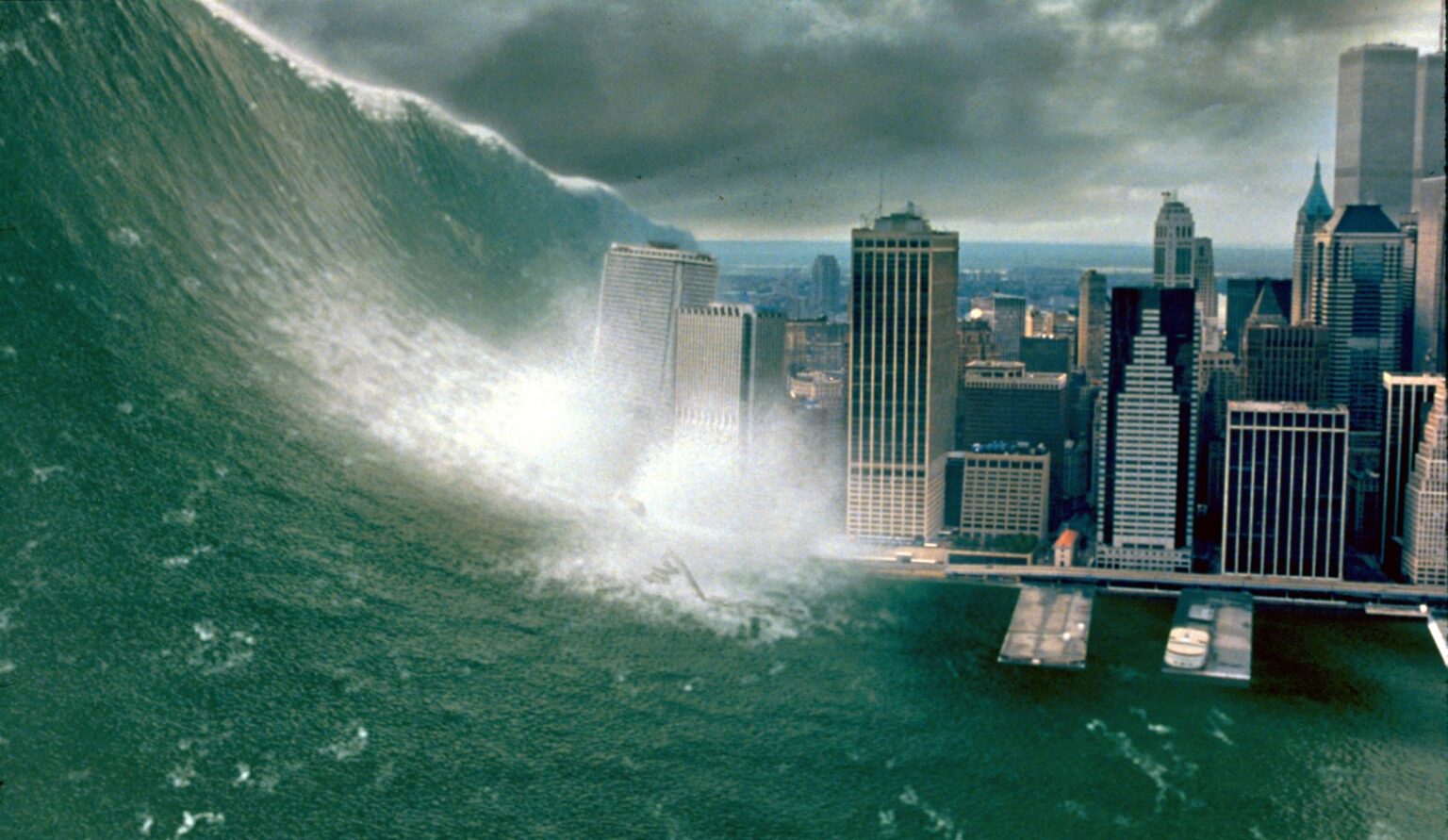
Despite the similarity in concepts, Deep Impact differs significantly from Armageddon in its tone. It is a much more contemplative and measured film, where the emphasis is on how the impending catastrophe affects people. We see that initially, humanity tries to live in normalcy, hoping for the threat to be averted. But when hope fades, everything gradually starts to crumble, and the characters have to come to terms with the inevitability of the impending disaster.
Interestingly, NASA seems to have a much more favorable view of Deep Impact than Armageddon. In 2005, the space agency launched a probe that later impacted the Tempel 1 comet. They named this mission Deep Impact
Gravity
What is the film about?
A spacecraft experiences a catastrophe. The only survivors are the researcher Ryan Stone and veteran astronaut Matt Kowalski who were spacewalking during the event. Now they must find a way to return to Earth.
What makes it interesting?
There is a belief that disaster films are nothing more than junk. Some consider them entertaining to watch but lacking significant artistic value compared to “true” cinema.
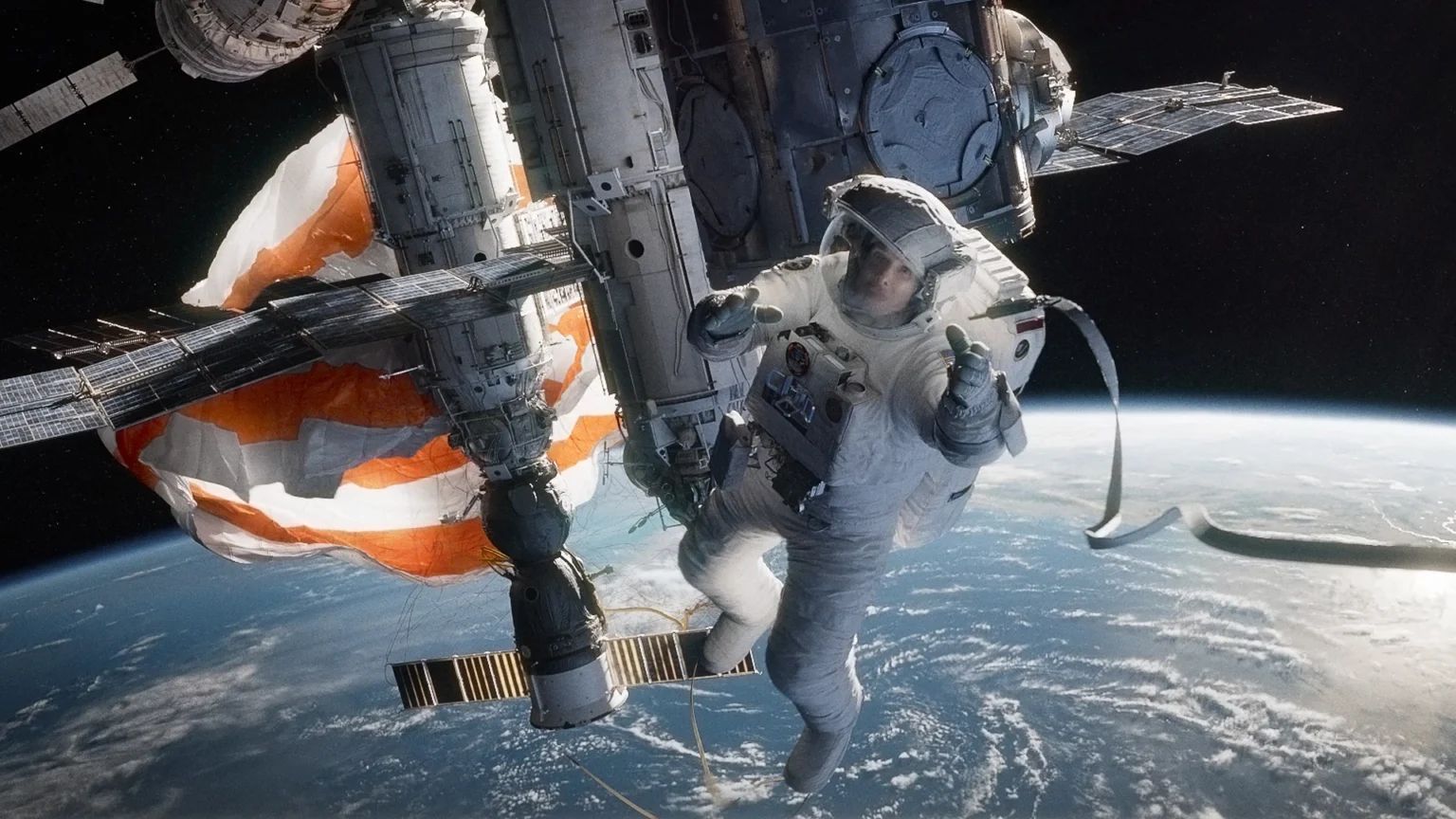
Alfonso Cuarón’s Gravity completely disproves this myth. It is, without a doubt, the most critically acclaimed space film in history. The film received seven Oscars, including Best Director and Best Cinematography, and came close to winning in the categories of Best Picture and Best Actress. None of the classic space films that are considered masterpieces come close to achieving such accolades.
All these awards are entirely justified. Alfonso Cuarón’s film is flawlessly executed. In just 91 minutes (which, by the way, is the duration of one orbit of the International Space Station around Earth), we embark on a true journey on space roller coasters with Sandra Bullock as the main protagonist. We observe the rapidly changing images of the shuttle’s demise, and the telescope’s, and the ISS’, and later the Chinese space station’s. We barely have time to catch our breath before the main character finds herself in another life-threatening situation. And so it continues until the final moments.
All of this is complemented by Sandra Bullock’s outstanding performance, remarkable cinematography, and impeccable visual effects, which make the film as visually stunning as it was ten years ago. Therefore, Gravity will likely hold the title of one of the most spectacular disaster films in history for a long time.
Don’t Look Up
What is the film about?
Two astronomers discover a new comet and learn that it will collide with Earth in six months, leading to the end of all life on the planet. They try to warn the authorities about the impending catastrophe… but they have more important matters to attend to.
What makes it interesting?
Of all the films on our list, Don’t Look Up is formally the only “non-serious” one. Its authors never hid that they were making a satirical comedy. However, despite the natural irony and hyperbole of the genre, the film touches on highly relevant issues. Among them are unhealthy fixation on social networks, degradation of the political class, atomization of society, greed of corporations that seek to maximize profits regardless of anything, culture of clickbait headlines and, of course, loss of trust in science.

Thanks to this, Adam McKay’s film, although it divided professional critics, found favor with ordinary viewers. Many realities depicted in the film with a sufficient degree of irony are presented quite directly, without any subtle subtext. We have all encountered similar manifestations of absurdity and human folly in our lives.
Furthermore, the film can also boast a fantastic cast. It features Leonardo DiCaprio, Cate Blanchett, Meryl Streep, Jonah Hill, and Timothée Chalamet. It is also worth mentioning Mark Rylance, who managed to create a simultaneously terrifying and highly comical portrayal of a modern billionaire, parodying tech moguls such as Elon Musk, Steve Jobs, and Mark Zuckerberg.
Therefore, Don’t Look Up can be regarded as a cinematic adaptation of the famous quote by Albert Einstein: “Only two things are infinite, the universe and human stupidity, and I’m not sure about the former”

